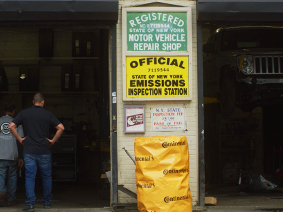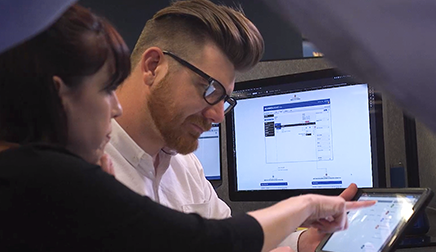

Interview with Aaron Stokes, Part 3
ALLDATA recently interviewed Aaron Stokes, the founder of Shop Fix Academy, owner and operator of five auto repair shops, and the radio show host of “Fixin’ Cars with Aaron Stokes” on Nashville’s 99.7.
Watch our exclusive three-part interview.
ALLDATA: During the COVID shut down, we saw on your Facebook that a lot of shops were closing, but probably an equal amount of people were saying, “We’re on fire, we’re doing excellent, we can’t keep the business away.” What was the difference between these shops?
AARON STOKES: All the shops that are in the cities, urban areas, were very much impacted. All the shops that were more rural and in the country, COVID didn’t affect them as much.
And so everybody was still afraid, so you had people not buying as many new cars, right, didn’t make large purchases. And so if anyone went to a repair shop, they tended to spend more money on a repair versus deciding to go buy a new car.
But the difference was the outlying small towns – their grocery stores and Walmart and Target and their restaurants were all open when large cities were totally shut down. It was like it didn’t even exist in those areas, and I know because I went out and visited some of my clients. So you have to keep in mind that location determined a lot who was getting hit and who was not.
I had some clients near D.C. So it didn’t matter what you believed, that political firestorm that was happening there. Oh, my gosh. We had some clients there that were – they were down 60 percent for months, months. Then we’d have clients in West Virginia 100 miles away blown out, just absolutely blown out. So we saw that over and over.
Portland had a lot of stuff going on. So we have a client there that’s just outside of Portland, and his shops did okay but he was definitely feeling it. Then we had another shop in Oregon that was further outside of Portland and he was blown out.
So it just came down to if you were inside an entrenched and a large city that was really constricted, that became the dominant culture of that area, and so people weren’t – if they came to your shop, they spent a lot of money, arrows were up, but people weren’t out as much. And after – it took us about six or seven weeks to figure that out, but it was definitely the case across the country.
ALLDATA: Aaron, you brought up 228,000 roughly repair shops around the country. Where do you see that number going in the next 5 to 10 years? Do we have less independent repair shops, do we have more, do we have the same?
AARON STOKES: I think more. We’ve sold more cars in the last six years than we’ve ever sold in history. We have more cars in driveways than we’ve ever had in history. We have more drivers than we’ve ever had in history. This is a great time for the automotive industry.
We’ve sold more cars in the last six years than we’ve ever sold in history. We have more cars in driveways than we’ve ever had in history. We have more drivers than we’ve ever had in history. This is a great time for the automotive industry.
I potentially see a downturn in the economy in the next two to six years, and that always helps our industry. We always do really well when the economy slows down. I had some of my most explosive years in ’08, ’09, ’10, ’11, and ’12 and I think that we’re going to see that here again shortly.
And when that happens, car sales will dip. Well, then, dealerships don’t need as many technicians basically to do PDIs. And as cars come out of warranty, not as many cars are coming into the dealership. Those technicians get fed up of low hours. And what do they do? They go out and they start a business. Now, not all of them, but a lot of them do.
So I think the lack of technicians in the marketplace and the demand for repair is going to create a vacuum where you’ll be able to make some good money in this industry. And I truly believe there’s going to be a new crop of owners coming up in this next downturn, probably leaving the dealerships – some from independents but mostly leaving from the dealerships as dealerships cannot sell as many cars, can’t keep their bases full doing prepaid maintenance and warranty claims, et cetera. And technicians need to feed their families, and I could see a lot of them starting out and trying to make a go at it out there in the marketplace.
There’s probably close to 250,000 shops right now. But at the end of the day, there’s going to be more, absolutely.
Want to see how ALLDATA can improve shop efficiency? Check out our suite of products, each designed to contribute to both shop efficiency and productivity.
If you would like to read more articles like this one please subscribe to ALLDATA News.









